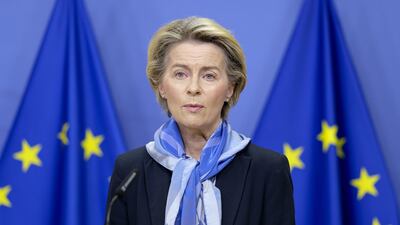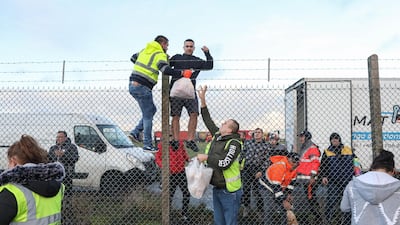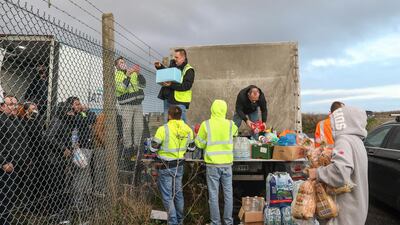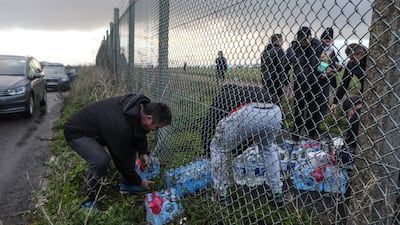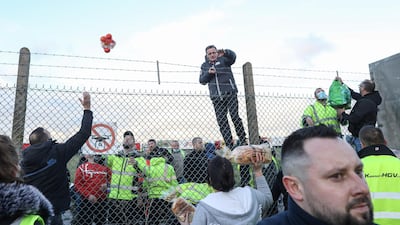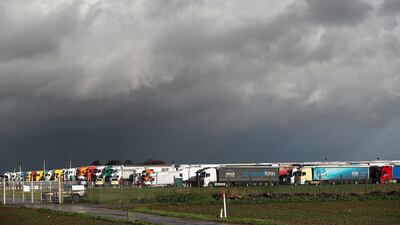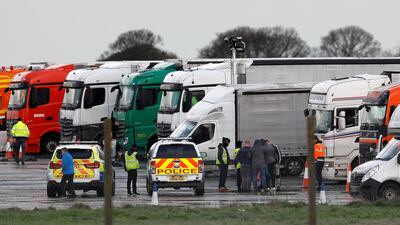The UK and EU sealed a historic trade deal today, setting out the terms of their relationship for years to come.
British Prime Minister Boris Johnson held his arms aloft in victory in a photo he tweeted with the words "The deal is done" after clinching a free-trade deal with the European Union on Thursday at the 11th hour.
European Commission President Ursula von der Leyen said: “We have finally found an agreement. It was a long and winding road, but we have got a good deal to show for it.
“It is fair, it is a balanced deal, and it is the right and responsible thing to do for both sides. Parting is such sweet sorrow."
Mr Johnson had been in close contact with Ms von der Leyen in recent days as efforts intensified to get a deal over the line.
After 10 months of talks, negotiations had been deadlocked. The final hurdle was understood to be over fishing rights for European boats inside British waters.
Those discussions about the legal text – around 500 pages – continued through the night as negotiators haggled over the final details.
But even the final hours were not without drama. Despite briefings that an announcement was due early Thursday, more wrangling over fish quotas caused a last-minute hitch, pushing back the announcement by several hours.
The key points
The deal has elements which can be heralded as a victory for either side, with Britain regaining sovereignty over its laws and the EU still able to keep its regulations in place.
The key point that Mr Johnson can now make to the 52 per cent of British people who voted for Brexit is that the country has “taken back control” of its borders, laws, money and trade.
At the same time Britain has secured unprecedented access to European markets that will allow it to continue free trade with bloc.
A crucial element is that Britain will no longer be subject to EU law and the European Court of Justice. The deal has given British companies access to European markets on a “zero-tariff, zero-quota”, with no role for the ECJ in policing the accord.
The final sticking point in the deal came over fishing rights for the large European trawler fleet that makes significant catches off Britain. That was finally resolved with the EU’s quota of fish in British waters reduced by 25 per cent over the next five years, with annual renegotiations. Crucially to Brexiteers, Britain will now regain ‘sovereignty’ of its coastal waters. However, the quota of a 25 per cent cut is a substantial climbdown from the 80 per cent Britain had originally demanded and the 35 per cent offer London made a few days ago.
But Britain appears to have achieved a victory on one aspect of fishing after Brussels backed down on “cross-retaliation” tariffs to the UK economy should London decide to change quotas after the five years has elapsed. This so-called “punishment clause” has now been dropped.
A new chapter
Ms von der Leyen told a news conference: "It's time to turn the page and look to the future. We are long standing allies. We share the same values and interests."
At his press conference in Downing Street, Mr Johnson described the agreement as "a good deal for the whole of Europe". He claimed the UK could now do "even more trade" with the EU and would drive jobs and prosperity across the whole continent.
“We have taken back control of our laws and our own destiny,” he said.
On the contentious issue of fishing rights, he said the UK would now have “prodigious quantities”, while suggesting subsidies could be on the horizon.
German Chancellor Angela Merkel said she was "confident" the Brexit deal is a "good outcome".
Irish premier Micheal Martin - whose EU member state would have been hard hit by a no-deal - said the accord was "very welcome".
"While we will miss the UK from the European Union, the fact that a deal is now in place means we can focus on how we manage good relationship in the years ahead," he said on Twitter.
French President Emmanuel Macron responded to the Brexit deal, saying the united and firm position taken by Europe had paid off.
"The agreement with the United Kingdom is essential to protect our citizens, our fishermen, our producers. We will make sure that this is the case," Macron said on Twitter.
"Europe is advancing and can look towards the future, in a united and sovereign manner, and with strength," added Macron
No-deal averted
A deal covering the UK-EU trading relationship worth almost £670 billion ($91bn) will come as a relief to business leaders.
The UK’s Office for Budget Responsibility had forecast that a no-deal Brexit could wipe 2 per cent off gross domestic product – a measure of the size of the economy – in 2021, adding to the damage to jobs and livelihoods already caused by coronavirus.
Hundreds of trucks backed up around the southern English port of Dover earlier this week offered a sobering reminder of the potential consequences of ending Britain's transition period on December 31 without a deal.
European stock markets edged higher at the open on Thursday in anticipation of a deal.
London's benchmark FTSE 100 index gained 0.2 per cent to 6,506.07 points at the start of a shortened pre-Christmas trading day, while the pound was up around half-a-per cent against the euro and dollar.
The deal Mr Johnson secured is likely to pass through Parliament with Labour expected not to oppose it – the party leader Sir Keir Starmer has stressed that an agreement with the EU would be in the national interest.
The negotiations in Brussels were fuelled by a late-night delivery of pizzas.
Following the announcement of the political accord, Ms von der Leyen's Commission will send the text to the EU member states.
They are expected to take two or three days to analyse the agreement and decide whether to approve its provisional implementation.
The UK parliament will also have to interrupt its end of year holidays to vote on the deal before the December 31 cut-off.
Once it is signed off and the text published in the EU's official journal it will go into effect on January 1 when Britain has left the bloc's single market.
The European Parliament will then have a chance to retrospectively approve the deal, at some point in 2021, EU officials said.
Assuming the process goes as planned, the negotiating teams will have agreed the mammoth deal in record time.
And the 11th-hour deal heads off the threat that Britain could crash out of the club after 47 years of shared history with no follow-on rules.
With Britain outside the EU single market and customs area, cross-Channel traders will still face a battery of new regulations and delays.
Economists expect both economies, already weakened by the coronavirus epidemic, to take a hit as supply chains are disrupted and costs mount.
But the threat of a return to tariffs will have been removed, and relations between the former partners will rest on a surer footing.
Earlier, Brexiteer group the ERG said it would examine any deal carefully. “Assuming a deal between UK and the EU is officially confirmed, the European Research Group will reconvene the panel of legal experts, chaired by Sir William Cash MP, to examine the details of the deal and legal text,” the group said.
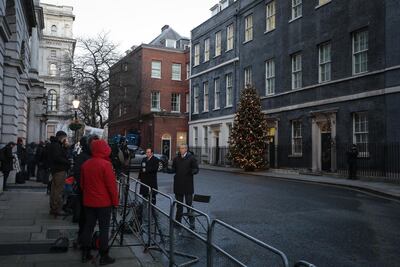
“The team of highly-experienced lawyers, previously known as the ‘star chamber’, was first assembled in 2019 to examine the legal aspects of Theresa May’s original Withdrawal Agreement.
“Given that the new agreement is also highly complex, the star chamber will scrutinise it in detail to ensure that its provisions genuinely protect the sovereignty of the United Kingdom after we exit the transition period at the end of this year.”
But it is not only hardcore Eurosceptics who could be critical. Lord Barwell, Theresa May’s former chief of staff, said “the truth is the deal means the introduction of significant barriers to free trade” through customs and regulatory checks.
But he acknowledged “it is better than no deal and we could certainly do with some good news”.
Britain's years-long battle over Brexit
From Britain's shock vote to leave the European Union in the 2016 referendum to a Christmas Eve trade deal after months of talks, Brexit has been a rocky – and divisive – process.
Following decades of arguments over Europe, Britons voted by 52 per cent to 48 percent to become the first nation to leave the EU bloc.
Conservative leader David Cameron, who led the campaign to remain in the EU and called the vote expecting to win, resigned as prime minister the next day. He was replaced by Theresa May, the interior minister who also backed remaining in the EU.
Mrs May formally triggered the exit process on March 29, 2017, sending a notification letter to Brussels that gave Britain until March 29, 2019, to leave.
Ending more than a year of acrimonious talks, British and EU negotiators agreed a draft divorce deal on November 13, 2018. But Mrs May faced an angry backlash from her own Conservative party over its terms and MPs voted against the deal in the biggest government defeat in British parliamentary history.
Brussels refused to re-negotiate and the EU agreed to delay Brexit until May 22, then October 31, 2019.
The European election defeat and parliament's rejection of her Brexit deal forced Mrs May to step down as Conservative leader on June 7.
On July 23, party members chose Brexit figurehead Boris Johnson as their new leader. He became prime minister the next day.
On October 22, British MPs approved in principle a new Brexit deal struck days earlier with the EU and on October 28, EU members agreed to postpone Brexit until January 31, 2020.
Mr Johnson's resounding win in a snap general election on December 12 smoothed his Brexit bill's passage through parliament on January 9, 2020. The divorce took place on Friday, January 31.
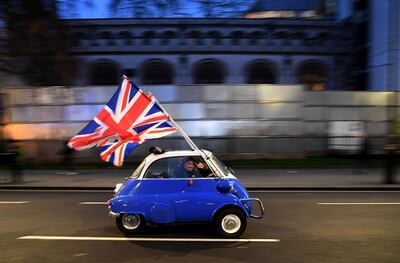
An extendable transition period was agreed up to December 31, 2020.
In March 2020, the EU and Britain began difficult negotiations on their future trade relationship. On September 8, the two sides opened an eighth round of negotiations as Mr Johnson warned that if there was no compromise by October 15 he would walk away with no deal.
The October deadline came with no sign of a deal. Talks ran into December, and Mr Johnson headed to Brussels to meet Ms Ursula von der Leyen to try to break the deadlock.
Negotiators worked around the clock up to Christmas Eve to craft a legally binding text in time for parliamentary ratification on both sides of the Channel.
